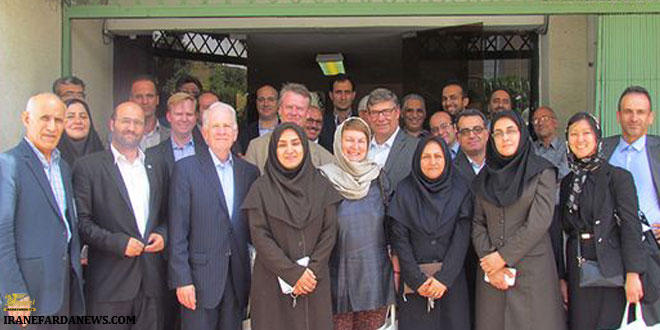
By: Seth Slabaugh
MUNCIE — In June of 2015, Ball State University professor Ken Holland joined a delegation of senior U.S. higher education representatives on an educational diplomacy trip to Iran.
Nine months later, a group photo of the delegation — at the center of which stands Holland — was published on the Mashregh News online website affiliated with the Islamic Revolutionary Guard Corps, above a caption reading, “Photographing with American spies in Iran.”
The headline of the accompanying story was, “The hospitality of Iranian universities for top spy,” a reference to the leader of the delegation. Other photographs of the group bore captions like, “A week full reception of the America’s influence,” “Meetings with university officials to our country infiltrators America should sound alarm bells … ” and “Are the American Board of giving gifts to the University of Shiraz the real purpose of the visit to Iran?”
Now, the international news agency Reuters is reporting that such claims published by conservative media sources in Iran have hampered the initiative to increase academic cooperation between the two countries.
“The negative press reports have cooled efforts to rebuild educational ties in the wake of the landmark nuclear deal, two U.S. officials said,” Reuters reported this week. “They said the U.S. government is now cautioning American universities against moving too fast and that the schools themselves are treading warily.”
Holland, who directs the Center for International Development at Ball State, told The Star Press on Wednesday he was familiar with the allegations.
“They are completely unfounded,” he said. “The goal of the visit was to prepare the groundwork for expanded relationships between U.S. and Iranian higher education institutions.”
The trip to Iran was led not by the U.S. government but by the nonprofit, New York City-based Institute of International Education’s (IIE) president, Allan Goodman, who served as presidential briefing coordinator for the director of the CIA during the Jimmy Carter administration. Goodman later became dean of the School of Foreign Service and professor at Georgetown University.
IIE has done similar pioneering work in Myanmar (Burma) and Cuba.
“Soon after I returned, the (Ball State) administration … decided to put that relationship on hold,” Holland said in an interview on Wednesday. “Ball State decided to take a wait-and-see approach. We made initial contacts but are not developing those contacts until Iran’s relationship with the U.S. is more clear.”
Holland joined representatives from Pitzer College, Rutgers University, the University of Southern California and Wayne State University in visiting 13 Iranian universities and research institutes.
“Iran is a safe country, and the Iranian people were uniformly friendly and expressed positive feelings toward the United States,” Holland told The Star Press shortly after he returned home.
But various elements in Iran remain hostile to the United States. Since the U.S. and Iran reached a plan of action to address international concerns over Iran’s nuclear program in July of 2015, Iran has continued to harass, arrest and detain U.S. citizens, in particular Iranian-Americans, according to the U.S. Department of State.
Iranian authorities have unjustly detained or imprisoned Iranian-Americans, including journalists, businessmen and academics, on charges including espionage and posing a threat to national security, the state department says in its latest travel warning.
The spy allegations don’t surprise Holland. “Fits and starts” and “bumps along the road” are expected when two countries that have had hostile relations try to become friendly, Holland said.
“I do know after my delegation returned there was an effort to invite an Iranian delegation of higher education leaders to visit us as a matter of reciprocity, and that indication has not been acted on by the Iranian government,” Holland said. “I see it as the ball is in their court now. Obviously, there is some activity going on, but in terms of that official higher education delegation coming here as reciprocity, that has not happened.”
Shortly after Holland returned from Iran last year, Ball State issued a news release saying, “As a participating university of IIE’s Iran Higher Education Initiative, Ball State wants to create an exchange program with Iranian universities that emulates current programs offered by CID (Center for International Development) with Pakistan, Iraq and African countries. Holland said the potential is great for faculty exchanges between Ball State and Iranian universities, short-term study abroad programs for Ball State students to Iran and study visits to Ball State for Iranian doctoral students.”
Why is that now on hold? Why did Ball State change its plans?
BSU spokesperson Joan Todd told The Star Press: “There isn’t any change in position. We haven’t closed anything off nor did we ever establish a timeline.”
Only four Iranian students were enrolled at Ball State last year. How many will be enrolled this year is not yet known.
 khalijefars News, Blogs, Art and Community
khalijefars News, Blogs, Art and Community








